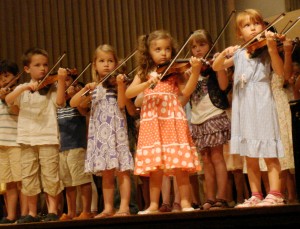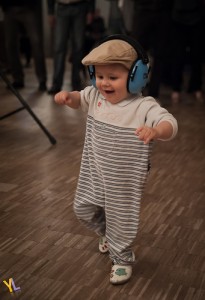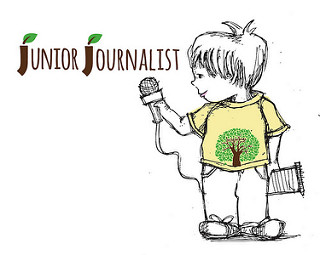Making music is fun, but research shows it can be much more than an enjoyable experience. Susan Pierotti examines why all children should have a musical education.
When I was six, I had to play in my teacher’s Christmas concert. I had only been playing the violin for a few months, but I could already simultaneously: read the lines and dots of sheet music; understand a foreign language (instructions of classical music are usually in Italian); recognise abbreviations (p = soft, f = loud); coordinate my right hand movements while setting patterns with the fingers of my left hand; and listen to whether I was in time with the piano. My Dad would say I was a genius, but every child has the ability to do this if properly trained.
Making music is a complex brain task, and the more complex the music, the more opportunities there are for brain-building – this is why classical music often proves better for brain development than rock-and-roll. Classical music is also more complex in instrumentation and harmony, so it primes the brain with pathways needed for other cognitive tasks.
Here are seven wonderful ways a musical education helps children’s brains:
1. Making music heightens the senses 音樂製作能提升感官
According to Gottfried Schlaug, MD, PhD, listening to and making music is not only an auditory experience, but also amultisensory and motor experience. Hearing, vision, sense of touch and fine motor skills are all heightened. Music creates emotions and engages pleasure and reward systems in the brain.
2. Music improves self-awareness 音樂能提高自我意識
Brain regions related to hearing and self-awareness appear to be larger in people who begin taking music lessons before the age of seven. Making music with others teaches children to listen with heightened awareness, to fit in with others and to become conscious of how what they’re playing affects others.
3. Music helps grow children’s brain 音樂可以幫助孩子們的大腦成長
Making-up music connects new pathways in your brain. Preschoolers who have music lessons are better at spatial (place) and temporal (time) reasoning tasks than those who receive computer lessons. And multitasking when playing instruments makes the brain more agile and able to learn complex functions at an early age.
4. Music makes children more creative 音樂能讓孩子們有更多的創意
Singing fosters language development and the exploration of words and rhymes through a familiar tune enhances memory. Think of nursery rhymes, the words to favourite songs or even ads that you can recall from years back because they were accompanied by a tune.
5. Music can improve children’s lives 音樂能改善兒童的生活
Learning classical music has revolutionised street cultures in South America where music methods have given some children a means of escaping violence, drugs and gangs. These learning systems generating resilience, talent and hope, and have been taken across the world, even to the Melbourne suburb of Laverton.
6. Music helps children relax 音樂幫助孩子放鬆心情
When you sing, the music has a calming effect. You breathe in between the phrases and exhale while singing. When you exhale, the heart slows down. Sahlgrenska Academy at the University of Gothenburg in Sweden found that, in group singing, it takes almost no time at all for singers’ heart rates to become synchronised, to fall into a shared rhythm guided by the song’s tempo.
7. Music improves school performance 音樂提高學生的學校成績
In a landmark Australian study, the power of classroom music has been proven incontestably and irrefutably to lift test results, in literacy and numeracy, to the equivalent of an extra year of school. School attendance and student wellbeing, engagement and participation across the curriculum are also raised.
There are many music-training classes, such as Yamaha or Suzuki methods, which take children as young as three. They’re designed as social activities to promote better learning outcomes. Children who attend these classes develop improved self-confidence, self-discipline, group interaction and coordination.
The best part is: you don’t need specialised, individual lessons to get the benefits of brain development that come with music making. You don’t even have to be good at it. You just have to do it. You can interact with children through simple rhythm and handclapping games, singing songs, lullabies and nursery rhymes.
You’ll almost hear them becoming smarter.
**Original Article from Splash ABC ***
***Original Article: http://splash.abc.net.au/newsandarticles/blog/-/b/1960037/7-ways-a-musical-education-can-help-a-child-s-brain“














